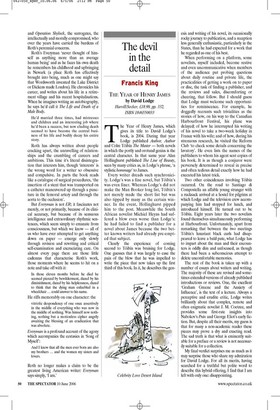The devil in the detail
Francis King
THE YEAR OF HENRY JAMES by David Lodge Harvill/Secker, £18.99, pp. 332, ISBN 1846550033 The Year of Henry James, which gives its title to David Lodge’s book, is 2004. During that year Lodge published Author, Author and Colm Tóibín The Master — both novels in which the portly and orotund genius is the central character. In that same year Alan Hollinghurst published The Line of Beauty, seen by many critics as, in Lodge’s phrase, ‘a stylistic hommage’ to James.
Every writer dreads such synchronicity. Lodge’s was a fine novel, but Tóibín’s was even finer. Whereas Lodge’s did not make the Man Booker long list, Tóibín’s not merely made the short list but was also tipped by many as the certain winner. In the event, Hollinghurst pipped him to the post. Meanwhile the South African novelist Michiel Heyns had suffered a blow even worse than Lodge’s: he had failed to find a publisher for a novel about James because the two better known writers had already pre-empted that subject.
Clearly the experience of coming second to Tóibín was bruising for Lodge. One guesses that it was largely to ease the pain of the blow that he was impelled to write the piece that now takes up the first third of this book. In it, he describes the gen esis and writing of his novel, its occasionally rocky journey to publication, and a reception less generally enthusiastic, particularly in the States, than he had expected for a work that he regarded as one of his best.
When performing on a platform, some novelists, myself included, become restive and even uncommunicative when members of the audience put probing questions about daily routine and private life, the practicalities of getting a work on to paper or disc, the task of finding a publisher, and the reviews and sales, discomforting or cheering, that follow. But I should guess that Lodge must welcome such opportunities for reminiscence. For example, he doggedly recounts such trivialities as the stories of how, on his way to the Canadian Harbourfront Festival, his plane was delayed; of how he interrupted his writing of his novel to take a two-week holiday in France with his wife; and of how, during his strenuous research, he visited the Reform Club ‘to check some details concerning the lavatory’. He even lists the names of the publishers to whom his agent sent copies of his book. It is as though a conjuror were perversely determined to reveal in precise and often tedious detail exactly how he had executed his latest trick.
Two other coincidences involving Tóibín occurred. On the road to Santiago di Compostella an affable young stranger with a rucksack arrived at a hostel for pilgrims at which Lodge and the television crew accompanying him had stopped for lunch, and introduced himself. He turned out to be Tóibín. Eight years later the two novelists found themselves simultaneously performing at Harbourfront. Unfortunately, apart from remarking that between the two meetings Tóibín’s luxuriant black curls had disappeared to leave a bald pate, what Lodge has to impart about the man and their encounters is oddly dim and unfocused, as though there had been a subconscious attempt to delete uncomfortable memories.
The rest of the book is taken up with a number of essays about writers and writing. The majority of these are revised and sometimes extended versions of already published introductions or reviews. One, the excellent ‘Graham Greene and the Anxiety of Influence’, is the text of a lecture. Always a perceptive and erudite critic, Lodge writes brilliantly about that complex, remote and often enigmatic novelist J. M. Coetzee, and provides some first-rate insights into Nabokov’s Pnin and George Eliot’s early fiction. But, despite all their merits, my guess is that for many a non-academic reader these pieces may prove a dry and exacting read. The sad truth is that what is eminently suitable for a preface or a review is not necessarily suitable for a collection.
My final verdict surprises me as much as it may surprise those who share my admiration for David Lodge. For all its merits, having searched for a truthful but polite word to describe this hybrid offering, I find that I am left with only one: disappointing.


















































































 Previous page
Previous page